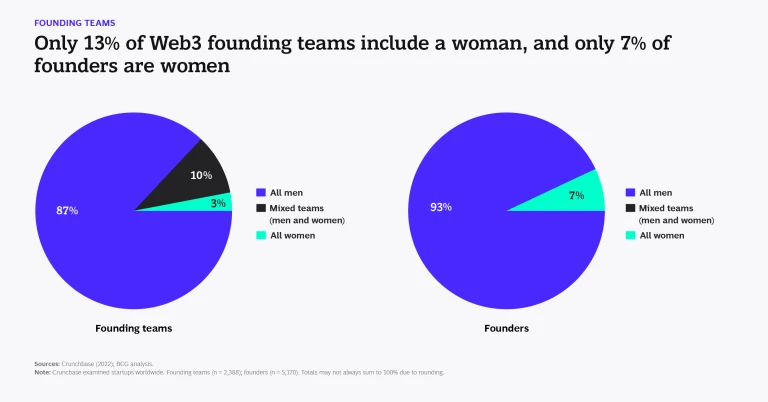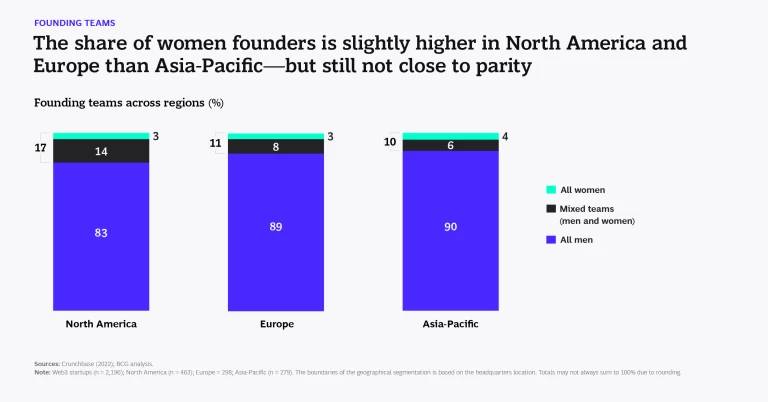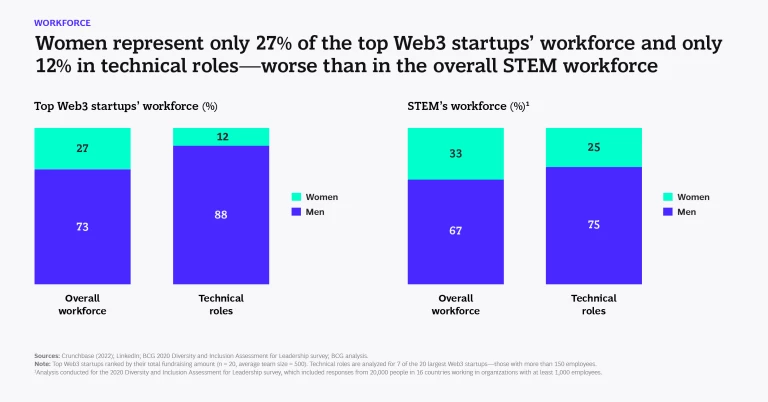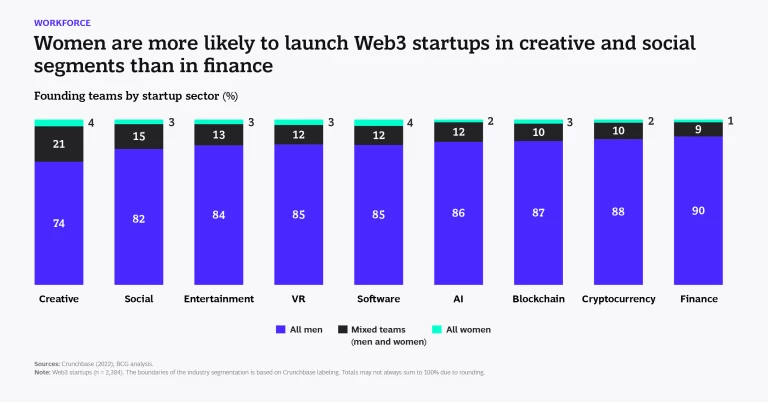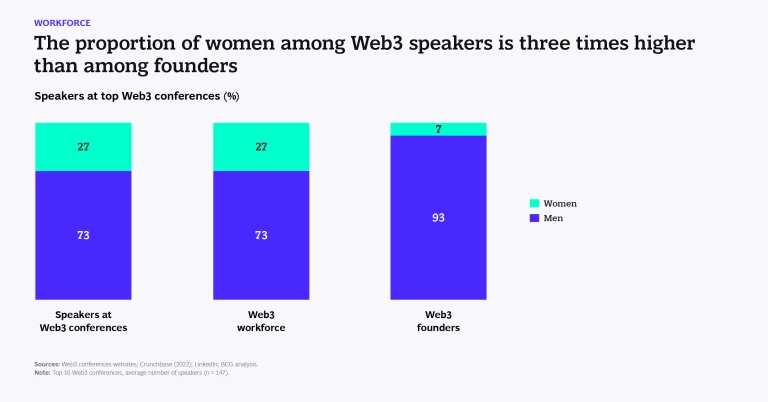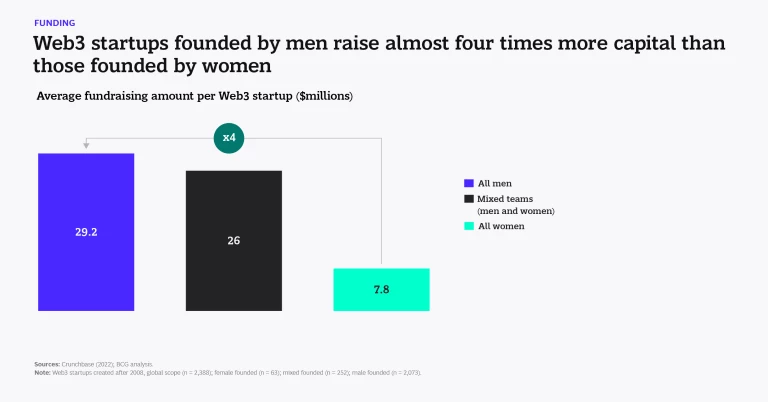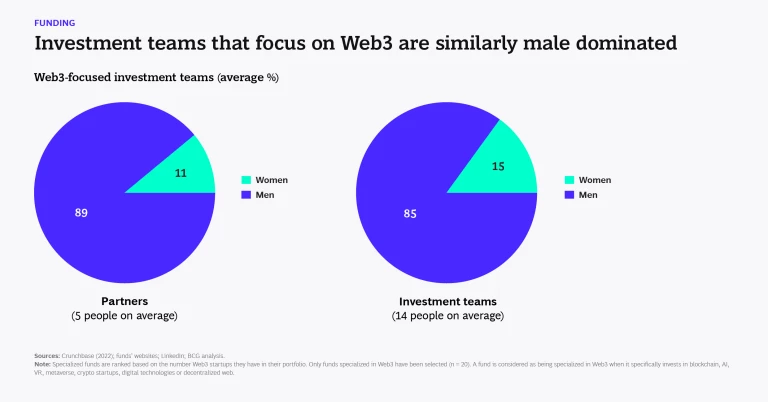Web3 companies are developing radical new applications involving the metaverse , blockchain, and crypto, but in one aspect these companies remain stuck in the past: Women are vastly underrepresented among founders and investors. In that way, we risk continuing to build an online world that replicates, instead of countering, the same biases that plague the physical world.
BCG X, the tech build and design unit of Boston Consulting Group (BCG), recently partnered with People of Crypto Lab—a creative and innovation studio that aims to boost diversity, equity, and inclusion in the Web3 ecosystem—to analyze the gender diversity of founders and investors using a database from Crunchbase consisting of nearly 2,800 participants worldwide.
The results are not encouraging:
- Only 13% of Web3 startups include a female founder. Within that group, 10% of founding teams include both men and women, and only 3% of companies have a team that is exclusively female. All numbers are worse than average for startups overall.
- The gender disparity extends to the overall web workforce. Among all employees at top Web3 startups, the share of women is higher (approximately 27%), but they are often clustered in nontechnical roles such as HR and marketing.
- In funding, the split is even wider. All-male founding teams raise nearly four times as much, on average, as all-female teams (almost $30 million compared to about $8 million). Among companies that have raised more than $100 million, the percentage with all-female founding teams is zero.
These findings shine a light on critical underrepresentation that sometimes gets masked in other studies. Many of the previous studies looked at mixed teams (those consisting of men and women). But our analysis goes one step further and looks at all-women founding teams and shows that most metrics decline in line with the share of women involved. All-male teams have the most success in attaining funding, mixed teams with men and women are in the middle, and all-female teams fare the worst. Given these results, it is understandable why many women are weary of joining or investing in tech startups. This underrepresentation of women has many costs: a growing body of BCG research has found that companies with diverse leadership teams are better at innovation and more profitable.
Subscribe to our Digital, Technology, and Data E-Alert.
The gender imbalance in the Web3 ecosystem has clear implications for how people represent themselves online, transact business, and interact with each other. Thus, the impact of the underrepresentation we are witnessing today may be potentially greater than those of earlier-generation web businesses. For brands and digital platforms entering Web3, spaces designed predominantly by white men—with greater usage rates by white men—will forego a huge business and monetization opportunity from the start. The default avatar options in the metaverse are often male, white, and cisgender. It is important that Web3 offerings be designed by diverse groups of people who understand the lived experience of the target users.
The good news? Because the Web3 ecosystem is still early in its development, there is time to fix the problem. The following measures can help:
- Measure everything. A critical first step is granular, objective measurement and reporting about the representation of women and other aspects of diversity—across the entire ecosystem of company founders, employees, and investors. No one can solve the problem until they have data quantifying its scope and the pace of progress over time.
- Make sure women are represented on investment teams. There is clear data showing that unconscious bias can sway funding decisions. Put simply, all-male investment teams are more likely to back all-male founding teams. Given the rise of institutional focus on gender disparities in technology, some VC firms now require that investment teams include at least one woman.
- Design brand experiences to be inclusive. Companies creating a digital presence in Web3 should ensure that they are creating the widest range of experiences for the broadest possible base of consumers.
- Build a supportive ecosystem. Companies need to invest the time and resources in ensuring that female founders and investors in the Web3 space can tap into strong networks that are diverse and inclusive. Mentorship—from women and men—is especially important in opening doors for aspiring female founders and investors. Web3 summits and conferences should commit to sponsoring events that work toward ensuring gender parity among speakers, with a commitment to at least 30% women speakers as a start.
- Partner with regulators. As governments and nonprofits focus more on environmental, social, and governance issues, they are developing stricter reporting requirements and other measures regarding the gender makeup of companies and industries. Companies and investors have an opportunity to proactively collaborate and help shape those regulations, rather than simply waiting for them to emerge.
Thanks to the work of the #MeToo movement and the women’s rights movement more broadly, people are far more attuned to gender biases than in the past. Web3 represents the first major advance in technology since that awakening. Unfortunately, the investment ecosystem is still wired in favor of men. Building a Web3 with diverse startup investors, designers, and more is not only a moral imperative, it is critical for business success and the future of innovation.
ABOUT PEOPLE OF CRYPTO LAB (POC Lab)
ABOUT BCG X
Turbocharging BCG’s deep industry and functional expertise, BCG X brings together advanced tech knowledge and ambitious entrepreneurship to help organizations enable innovation at scale.
With nearly 3,000 technologists, scientists, programmers, engineers, and human-centered designers located across 80+ cities, BCG X builds and designs platforms and software to address the world’s most important challenges and opportunities.
Teaming across our practices, and in close collaboration with our clients, our end-to-end global team unlocks new possibilities. Together we’re creating the bold and disruptive products, services, and businesses of tomorrow.
ABOUT BOSTON CONSULTING GROUP
Our diverse, global teams bring deep industry and functional expertise and a range of perspectives that question the status quo and spark change. BCG delivers solutions through leading-edge management consulting, technology and design, and corporate and digital ventures. We work in a uniquely collaborative model across the firm and throughout all levels of the client organization, fueled by the goal of helping our clients thrive and enabling them to make the world a better place.




